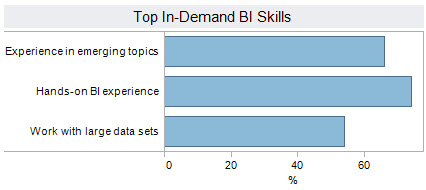Global Study Forecasts Shortage of 1.5 Million BI Analysts
The Business Intelligence Congress II, co-hosted by Teradata University Network (TUN) recently published “The State of Business Intelligence in Academia in 2010”. While business intelligence (BI) has carved out a strong niche in the real world, colleges are still behind in training students to enter this field.
To begin, BI is rarely offered as a formal field of study. Among the schools surveyed in the TUN study, BI is offered as a degree or concentration at only 3 (out of 129) institutions surveyed, and only 12 (out of 80) graduate schools.
Most universities teach only bits and pieces of BI skills across various programs – giving students an understanding that is wide and shallow or too narrow and technical. Barbara Wixom, an Associate Professor at the University of Virginia comments, “It’s clear that evidence-based decision-making and the data analysis required to support it are now part of the fabric of many areas of business across many industries. This requires that business intelligence be part of the curricula of many different university majors. The survey shows that too often education and experience with BI offers too narrow a view of BI and is not reflecting real-world contexts.”
As a result, the discrepancy between university training and employer needs is evolving into a major employment gap. A study by the McKinsey Global Institute found that this gap amounts to a shortage of approximately 1.5 million BI analysts in the US alone. “By 2018, in the United States, we estimate that 4 million positions will require (deep analytical) skills in a big data world. However, if we add together the number of people with these skills and new graduates who will enter the market (on current trends), we reach a total of only 2.5 million people in the United States in 2018” (McKinsey Global Institute, “Big Data: The next frontier for innovation, competition and productivity”, May 2011).
To narrow this employment gap, it’s critical to first understand the specific skill sets that are lacking. In the TUN survey, they asked hiring managers at IT firms what top skills they look for in a new hire. The responses:
To address these specific skills, both Tableau and TUN offer universities a host of BI resources such as complimentary software, unlimited training resources, and live webinars. Through real-world case studies, students gain first-hand BI experience, and the opportunity to investigate and work with large data sets. To learn more about using data analysis in schools and universities, visit the Tableau Academic Programs page: http://www.tableau.com/academic.
Subscribe to our blog
Ricevi via e-mail gli aggiornamenti di Tableau.


